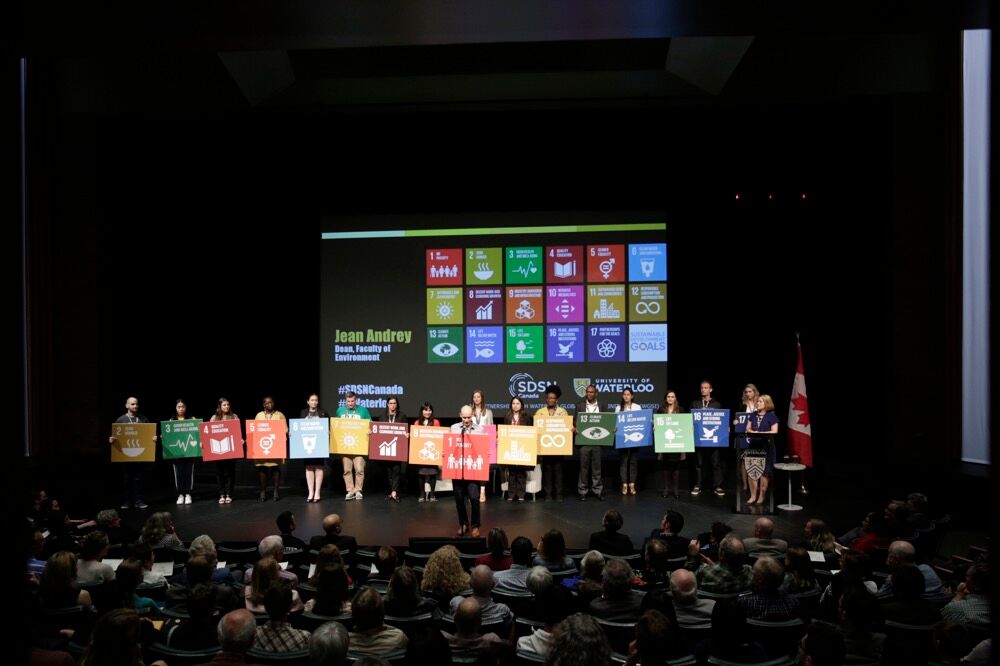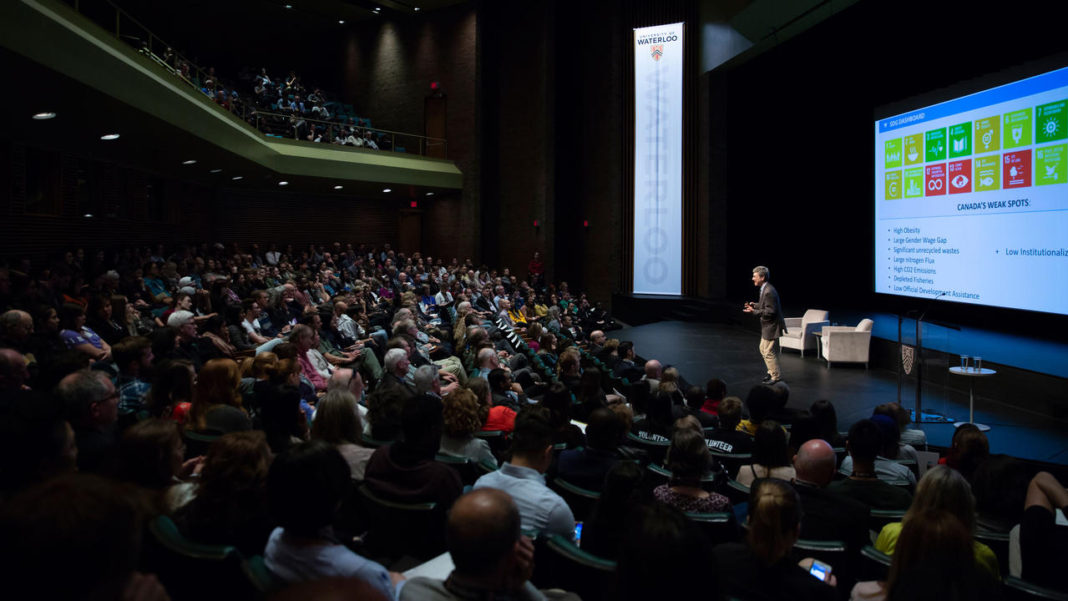The United Nations (UN) Sustainable Development Goals (SDGs) have a renewed importance at the University of Waterloo. Jeffrey Sachs, Professor at Columbia University, author, and Special Advisor to UN Secretary-General on the SDGs, was on campus May 7 to commensurate the launch of the Canadian chapter of the Sustainable Development Solutions Network (SDSN).
The Canadian chapter of the SDSN will be hosted in partnership with UWs Faculty of Environment and the Waterloo Global Science Initiative. The network is a way to move forward on the SDGs, which are a set of 17 goals created to tackLe world-wide problems such as hunger, climate change, and gender disparity. They were initiated in 2015 and are to last until 2030.
“We need to embrace [the SDGs] as our best hope to get something done… I can assure you, absolutely guarantee you, that they are the only global goals of this kind that we will have in this generation,” Sachs said.
The SDSN launch had a full line-up of speakers, starting with Amy Smoke from the Waterloo Indigenous Student Center, who gave a traditional thanksgiving address and song.
Feridun Hamdullahpur, President of UW, gave an introduction as well. “This is absolutely a momentous event. Not just for Canada but for the whole world.”
The network was endorsed by Prime Minister Justin Trudeau, of whom provided a letter read by Jean Andrey, the MC of the night and also the Dean of the Faculty of Environment.
“Thank you to the organizers of this wonderful event, and congratulations to the University of Waterloo’s Faculty of Environment for being chosen as the Canadian host of the network,” Trudeau was quoted.
The purpose of the Canadian chapter will be to facilitate research and problem solving on the SDGs, create a network of universities and civil society organizations across Canada, and to act as a bridge for Canadians to the global movement.
“[The SDGs] are framed around this idea of leaving no one behind. So they call on all of us, from the largest nation states to the smallest civil society groups amongst us, to try to work together, to make progress on each of these goals,” Andrey said.
“We are in a unique time in history with individuals and groups converging in dialogue and strategy, to address pressing environmental, social, and economic issues that face humanity,” she continued.
The network was officially launched after 17 students, from UW and other Canadian universities, presented each SDG. This network is the newest of 25 SDSN chapters globally.
Sachs spoke for over an hour, on topics from SDGs attainment to Canada’s global role to climate change severity.
“The [SDGs]… are adopted because we’re in trouble, and we’re in trouble in ways that we hardly recognize, unfortunately,” Sachs said. “A lot of what is happening– especially on the environmental side– is pretty insidious… we cannot get the political attention needed to get this done.”
A focal point of his lecture was the need for climate action. He explained that earth’s temperature has increased by 1.1 degrees Celsius since pre-industrial times. Scientists have found that the emissions built within the atmosphere will warrant another increase of 0.3 to 0.4 degree Celsius– even if all greenhouse gas emissions (GHG) were to stop immediately.
“We’re on a path towards three to four degrees C. And what we need to do is quite straightforward to describe. We need to stop and then to reverse: we need to stop the emissions of greenhouse gases and we need to begin to reverse the concentration of greenhouse gases by… afforestation, reforestation, restoration of degraded land.”
“What we certainly need to do, is to stop using fossil fuels… We should do it in a way that does not destroy the world economy, does not destroy development, does not destroy our prospects, does not have profound damage, and that means that we need to do it as fast as possible,” Sachs said.
Although he initially complimented Canada as a “wonderful country”, he provided much constructive criticism for the nation. “[Canada], despite the Prime Minister’s words, is not yet committed the way that it has to be to the reality of climate change.”
Sachs stated that the Trans Mountain and Keystone pipelines should not be built, and Alberta oilsands should not be exported. Instead, Canada should export renewable energy.
“Export the right thing. Export hydro power, please!… But don’t export stuff that’s going to kill the planet,” he said.

Despite that Canada sits near the top relative to other countries regarding its attainment of the SDGs, it still has areas to work on.
This includes high obesity, the gender wage gap, waste, a large nitrogen flux, high CO2 emissions, depleted fisheries, low official development assistance, and low institutionalization of the SDGs.
To reach the SDGs, Sachs provided six areas of change: decarbonization of the energy system, sustainable food & biodiversity, circular economy, smart infrastructure, sustainable cities, and investments in human capital.































